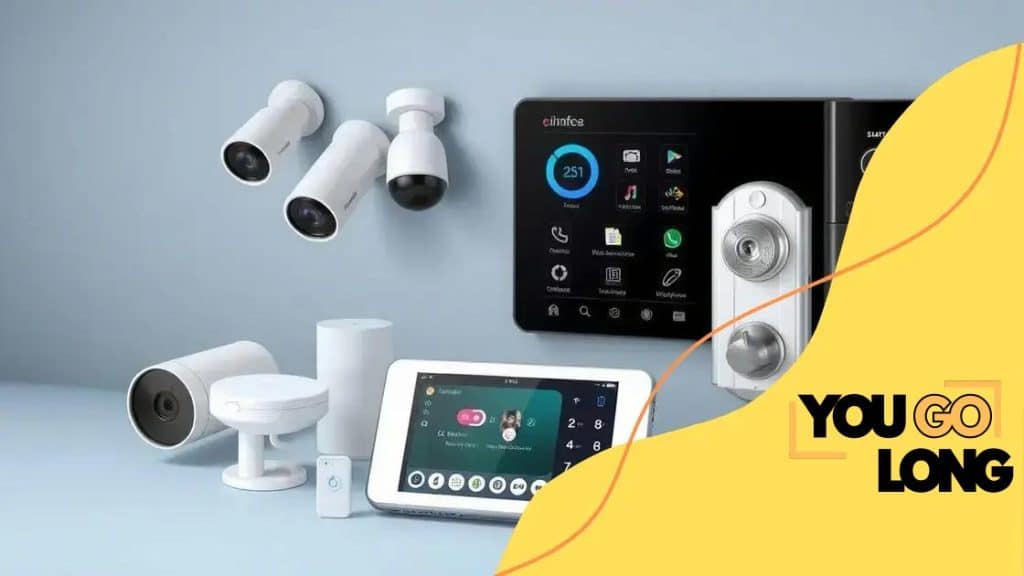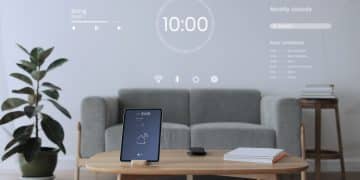The best smart home devices for home security

Advertisement
The best smart home devices for home security include smart locks, cameras, and integrated systems that provide real-time alerts, remote access, and enhanced safety for your home and family.
The best smart home devices for home security are here to give you peace of mind. Ever wondered how technology can make your home safer? Let’s dive into the best options available that can help protect what matters most to you.
Top features of smart security systems
Smart security systems have revolutionized how we protect our homes. They offer many features that make security easier and more effective.
Key Features to Consider
When choosing a smart security system, it’s important to know what features can enhance your home’s safety. Here are some top features:
Advertisement
- Real-time alerts: Receive notifications on your phone whenever something unusual is detected.
- 24/7 monitoring: Many systems provide continuous surveillance, ensuring your home is always protected.
- Remote access: Control and monitor your security system from anywhere using a smartphone app.
- Integration with smart home devices: Seamlessly connect with other smart devices, like lights and locks, for added security.
Another crucial aspect is the ease of installation. Most smart security systems are designed for DIY installation, allowing users to set them up without needing professional help. This user-friendly approach is appealing to many homeowners.
Advanced Technology
Modern systems often incorporate advanced technology such as facial recognition and motion detection. These features help to reduce false alarms by ensuring that only authorized individuals are alerted. Furthermore, smart cameras can record high-resolution video, allowing for clear images if an incident occurs.
In addition to these features, smart security systems often support cloud storage, ensuring that video footage is kept safe and accessible. This feature gives you peace of mind, as you can review footage when necessary. Incorporating all these elements makes smart security systems one of the best investments for anyone looking to enhance their home security.
Advertisement
Comparing smart cameras and traditional ones
When considering home security, smart cameras and traditional ones both have unique advantages. Understanding their differences can help you choose the best option for your needs.
Advantages of Smart Cameras
Smart cameras are equipped with features that enhance security significantly. Here are some key benefits:
- Remote access: You can view live footage from anywhere using your smartphone, ensuring you always stay connected.
- Motion detection: Smart cameras alert you instantly when movement is detected, allowing quick action against potential threats.
- Cloud storage: Unlike traditional cameras, many smart systems offer cloud storage options for easy retrieval of footage.
- Integration: These cameras can integrate with other smart home devices, creating a more cohesive security system.
In contrast, traditional cameras typically rely on being wired directly to a recording device. This setup may limit their placement options and can feel more cumbersome compared to the flexibility of smart systems.
Effectiveness in Security
While both types serve the purpose of monitoring, smart cameras often provide better overall functionality. For example, they use high-definition video, which enhances clarity when reviewing footage. Additionally, smart cameras frequently come with advanced features like facial recognition or two-way audio, features rarely found in traditional cameras.
Ultimately, the choice between smart cameras and traditional ones depends on your preferences and security needs. Each option has its strengths, but smart cameras offer enhanced usability and integration with modern smart home technologies.
How smart locks enhance your home security

Smart locks are a key innovation in home security. They offer enhanced features that traditional locks simply cannot provide. Understanding how these locks work can make a big difference in your safety.
Benefits of Smart Locks
One of the main advantages of smart locks is convenience. Here are some benefits you should know:
- Keyless entry: Easily unlock your door using a smartphone app or a code, eliminating the need for physical keys.
- Remote access: Grant access to guests or service providers even when you’re not home, all through your phone.
- Activity logs: Monitor who enters and exits your home, helping you keep track of all activity.
- Integration with other devices: Connect your smart lock with lights, cameras, and alarms for a fully integrated home security system.
Many smart locks also offer features like auto-locking, which secures your door after a specified time. This feature adds an extra layer of security by ensuring that you never forget to lock up after leaving.
Advanced Technologies
These locks often utilize advanced technology like fingerprint recognition or facial recognition to enhance security further. This means that even if someone tries to bypass the lock using traditional methods, they won’t succeed if they do not have the recognized fingerprint.
Additionally, many smart locks are designed for easy installation and compatibility with existing deadbolts. This way, you don’t have to replace your entire locking system to enjoy the benefits of advanced technology.
In summary, upgrading to smart locks can significantly boost your home’s security. They combine convenience, technology, and ease of use to help you protect your home effectively.
Integrating smart home devices for a cohesive system
Integrating smart home devices is essential for creating a cohesive security system. When all devices work together, they enhance overall safety and convenience.
Benefits of Integration
A well-integrated smart home system offers several advantages. Here are some key benefits:
- Seamless control: Access all devices through a single app or voice command, streamlining your experience.
- Automated routines: Set up routines that trigger multiple devices at once, such as locking doors and turning off lights.
- Enhanced security: Devices can share data with each other, improving threat detection and response.
- Energy efficiency: Coordinated control of lighting, heating, and cooling can lead to lower energy consumption.
When integrating devices, it’s crucial to choose products that are compatible with each other. Many manufacturers design their devices to work seamlessly within their own ecosystems, while others offer cross-compatibility with multiple brands. It’s worth researching which devices best suit your needs.
Examples of Integration
For example, you can connect smart cameras with smart locks. If the camera detects movement, it can send a notification to your smartphone and automatically lock the doors. Additionally, integrating smart lights can provide alerts by flashing when an intruder is detected. This multi-device collaboration enhances home security significantly.
Another effective integration is between voice assistants and various smart devices. With a simple command, you can lock doors, adjust thermostats, or activate home alarms. This level of convenience not only increases security but also enhances your daily lifestyle.
Ultimately, integrating your smart home devices creates a safer and more efficient living environment. When systems communicate with each other, the whole becomes greater than the sum of its parts.
Real-world success stories of smart home security
Real-world success stories provide inspiring examples of how smart home security devices can effectively protect homes and families. Many people have shared their experiences, highlighting the benefits of these technologies.
Case Studies Showing Effectiveness
One notable success story comes from a family in a suburban neighborhood. After installing a smart security system, they received an alert about suspicious activity in their yard. Thanks to the real-time notifications from their smart camera, they were able to contact the police immediately. The quick response led to the apprehension of a would-be intruder while he was still on their property.
Another example features a couple who frequently travel for work. They installed smart locks and cameras to monitor their home while they were away. Upon returning from a trip, they reviewed their smart camera footage and discovered that a package thief had attempted to steal a delivery. They shared this video on social media, raising awareness in their community about the importance of home security.
Community Impact
Smart home security devices not only protect individual homes but also have a positive impact on the wider community. Neighborhoods with a high concentration of smart security systems often report lower crime rates. For instance, in one city, the implementation of community-wide smart cameras reduced burglaries by 30% within a year.
Additionally, local law enforcement agencies are increasingly collaborating with homeowners to share data from smart security systems. This partnership enhances community safety, as police can analyze footage to identify patterns and respond more effectively.
Overall, these real-world success stories illustrate the substantial benefits of investing in smart home security systems. They not only provide peace of mind but also foster a safer community environment.
In conclusion, smart home security devices are transforming how we protect our homes. They offer convenience, enhanced security, and peace of mind. With many success stories highlighting their effectiveness, it’s clear that these technologies not only secure individual homes but also contribute to safer communities. By integrating smart devices into your home, you can enjoy a more connected and secure lifestyle. Investing in smart home security is a smart way to safeguard your loved ones and belongings. Don’t wait for an incident to realize the benefits—start enhancing your home security today!
FAQ – Frequently Asked Questions about Smart Home Security
What are smart home security devices?
Smart home security devices are technological tools like cameras, alarms, and smart locks that help monitor and protect your home.
How do smart locks work?
Smart locks use technologies like Bluetooth and Wi-Fi, allowing you to unlock your door using a smartphone app or secure codes.
Can I control my smart security system remotely?
Yes, most smart security systems allow remote access so you can monitor your home from anywhere using your smartphone.
How do smart home devices improve community safety?
When many homes in a neighborhood use smart devices, it can lead to lower crime rates as they share data and alert local authorities quickly.





